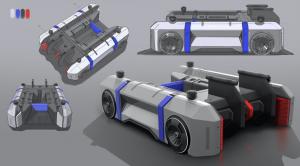
HALO, Moonware’s airside OS

ATLAS, Moonware’s autonomous vehicle
With recent news of significant delays due to IT failures, Moonware’s intelligent airport systems could improve efficiency in commercial and cargo aviation.
LOS ANGELES, CA, UNITED STATES, February 14, 2023 /EINPresswire.com/ — Holiday travel is near pre-pandemic levels, but that has brought a host of new challenges. This year, airlines left thousands of passengers stranded or with missing bags, and thousands of flights were canceled, delayed, or diverted. A Christmas blizzard that affected airlines across North America, particularly Southwest, has highlighted the fact that many stakeholders have been slow to invest in upgrading their IT systems, where archaic tools like walkie-talkies and paper are still prevalent.
Earlier in January, a rare Notice-to-Air Missions (NOTAM) outage grounded all flights in the US for two hours and delayed thousands of others in the subsequent days. Not long after, a near-collision incident at JFK between flights AA106 and DL1943 occurred due to miscommunication between air traffic control (ATC) and pilots. While disaster was narrowly averted, this was a scary reminder that lapses in radio-based communication still occur, and a technological refresh may be necessary to prevent such incidents in the future.
Moonware, a California-based startup, comes into the picture at a challenging time for air travel. The company is developing an “airside OS,” HALO, which coordinates the ground crew and equipment responsible for servicing aircraft with tasks such as baggage loading, fueling, cleaning, catering, and more. Optimizing these ground operations helps carriers reduce delays and turnaround times while increasing aircraft utility.
Weather-related issues affect the scheduling of staff needed to operate flights, ranging from pilots and cabin crew to ramp agents and ground handlers who are responsible for servicing aircraft. Moonware’s HALO app “Uber-izes” airport ground logistics, pairing ramp agents with flights through an automated system, which also uses smart routing to help ground crew navigate across the tarmac. Efficiently allocating people and vehicles across the airfield saves time and fuel, cutting emissions and costs.
Real-time data is key in the system’s ability to re-distribute staff and assets during last-minute schedule changes, which is absent in existing operations. Today’s legacy scheduling tools lack built-in redundancies for unscheduled changes and setbacks. Systems that account for the complexities in operational disturbances, regardless of weather, seem to be needed more than ever. “Our technology has the potential to revolutionize the way aircraft are serviced and turnarounds are handled, resulting in a more efficient and sustainable airport experience,” says CEO Javier Vidal.
Antiquated scheduling tools were greatly responsible for propagating the effects of the Christmas blizzard, where Moonware is modernizing the ground operations portion of the puzzle. But the company’s plans don’t stop there.
Beyond software, part of the company’s roadmap includes deploying autonomous and electric ground support equipment (GSE) to augment ‘last-mile’ airside tasks. “The biggest advantage of deploying autonomous vehicles in an airport is the controlled environment of operation. When compared to public roads, airfields are simpler to map, where markings on the tarmac and a myriad of signs can serve as built-in navigational cues” says CTO Saunon Malekshahi.
Pushback tugs (used to back out airplanes from the gate), could be automated to tow aircraft directly between gates and runways. Doing so would allow planes to keep their engines off while taxiing, saving fuel and helping manage congestion. In busy hubs like JFK, DFW, LAX or ATL, where thousands of flights are operated daily, it’s easy to see aircraft clumping on taxiways. In the case of the JFK runway incursion incident, airfield congestion can lead to greater room for error. While air traffic controllers and pilots hold stellar safety records, lapses in radio-based communication pose a tremendous risk that can be averted with these advanced solutions.
There is tremendous technical debt in aviation and the current systems in place will require improvements as more weather-related events, spikes in travel, or staff shortages take place. Moonware is currently working with industry leaders to bring its technology to market, with plans to start testing HALO in the coming months. Their mission is to enable what they call the “next-generation of aerial mobility,” with automated and sustainable airfields.
About Moonware:
Moonware is a venture-backed startup enabling the next generation of aerial mobility with automated and sustainable airfields. The company is building an integrated ecosystem of AI software and smart vehicles that optimally connect ground crew, aircraft and ground support equipment to efficiently service flights. Moonware’s vision is to fully handle aircraft autonomously from touchdown to takeoff, providing seamless aircraft turnarounds for a streamlined airport experience.
Contact Moonware
Moonware
[email protected]
Visit us on social media:
Facebook
Twitter
LinkedIn
Instagram
![]()







































